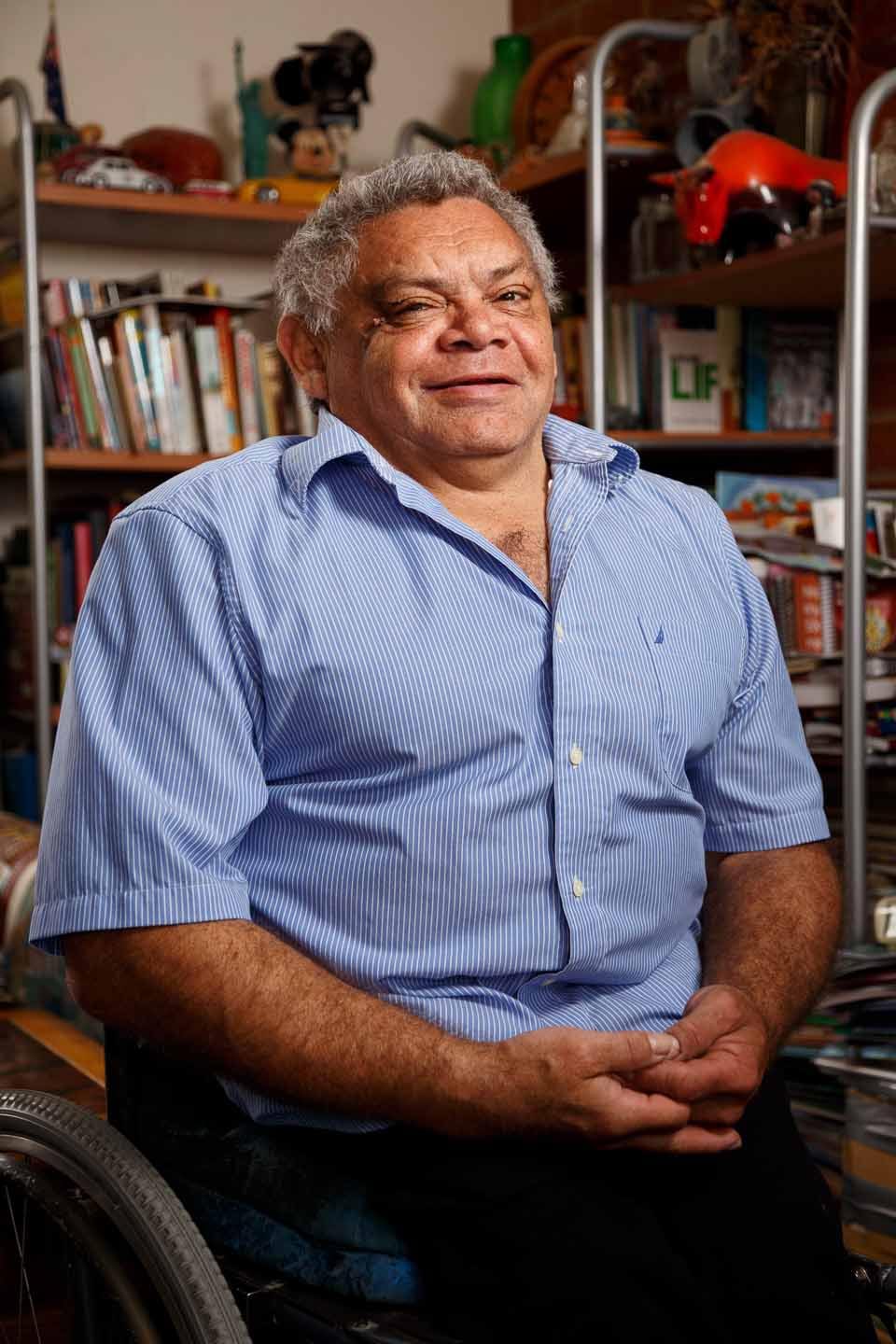
- Inducted:
- 2016
John Baxter is a Latji Latji / Narungga man who believes change occurs when people take action. His philosophy has inspired him to advocate for reconciliation, for the rights of Aboriginal people living with disabilities and for a greater understanding of the past to improve outcomes for the future. John is the second youngest of 7 children to James Baxter, a railway worker, and his wife Lorna (Maud). Sadly 2 of his siblings died in infancy. Born in Robinvale in north-west Victoria in 1960, John was diagnosed with Spina bifida and transferred to Melbourne’s Royal Children’s Hospital when 2 weeks old. He remained in the hospital for 2 years.
The early years
This was the era of the Stolen Generations. When discharged from hospital, John was not returned to his family, but placed temporarily at Allambie Reception Centre, a children’s home in Burwood operated by the Victorian Government. He was later fostered by loving parents, who cared for a number of foster children, all with disabilities, in their Box Hill home.
Despite the restrictions imposed by his disability, John remembers a happy childhood home where his foster mother encouraged his awareness of his Aboriginality. He was highly motivated to do well at school and attended Yooralla School for disabled children in Balwyn for his primary education.
He later attended Box Hill Technical School where the 3-storey building proved challenging for a boy on crutches. Nevertheless, he graduated and went on to complete an apprenticeship as a printer and graphic artist.
Understanding the past can lead to better outcomes for the future
In his late teens John became more curious about his Aboriginal identity. Access to his early medical records provided some clues about his place of birth. With the support of his foster mother, he took the initiative to find his family and was reunited with his father, siblings and extended family in Robinvale. Sadly, his mother, who had returned to her own country in South Australia, had died before John could meet her. He was later able to connect with her family at Point Pearce on the Yorke Peninsula.
Reconnecting with his family had a profound impact on John and made him aware of how little he knew of his own culture. It also reinforced in his mind the crucial role that family and culture play in developing identity. He also came to realise that an understanding of the past can lead to better outcomes for the future.
A great believer in the importance of culture and identity
Living for much of his life in Melbourne’s eastern suburbs, John was inspired by historic Wurundjeri leaders such as William Barak and Simon Wonga, who advocated for the rights of their people in the 1800s. He also became aware that, because of past policies, many Aboriginal people living in Melbourne’s east were, like him, not traditional owners from that area.
During the twentieth century many Aboriginal children of the Stolen Generations were placed in the numerous children’s homes and institutions located in the City of Whitehorse. Keen for their story to be told, John participated in the production of 2 films dealing with their experiences: Fractured, produced by Link-Up Victoria and Nobody’s Child.
A passionate advocate for reconciliation and cross-cultural understanding, John believes programs or initiatives aiming to achieve reconciliation must be more than mere symbolic gestures. They must have practical outcomes which benefit Aboriginal people. His strong conviction means he frequently acts as the ‘fly in the ointment’ in his advocacy work.
A Councillor with Reconciliation Victoria for a number of years, John is also a member of the Whitehorse Friends for Reconciliation group and contributed to the City Of Whitehorse Reconciliation Action Plan. He has also served on the City of Manningham Reconciliation Action Plan Working Group.
A great believer in the importance of culture and identity, John has been a driving force in uniting a number of groups to help stage Cultural Days at Blackburn Lakes Sanctuary where Elders and teachers can pass on cultural knowledge to children and their families.
John is a champion for the rights of Aboriginal people living with disabilities
He was a founding member of Aboriginal Disability Network Victoria. He was one of the first Victorian representatives on the national peak body First Peoples Disability Network Australia (FPDNA) and later became its Director. As a disability support community consultant for FPDNA, John came face to face with the problems of those living with disabilities in remote or isolated communities.
John works to build links between the disabled and the services available to them and promotes culturally-inclusive practices in mainstream agencies. In 2013 he represented FPDNA at the United Nations (UN) in Geneva. In 2014 he made a presentation at a UN conference in New York. John served on the Victorian Equal Opportunity and Human Rights Commission’s Disability Reference Group from 2014 to 2016. In 2016 he was appointed to the Victorian Disability Advisory Council, which provides advice to the Minister for Housing, Disability and Ageing.
John takes an active role in the life of Victoria’s Aboriginal community. He is President of the Committee of Management of the Koorie Night Market Incorporated, which operates at several locations around Victoria. The market aims to preserve culture, support Aboriginal businesses and craftspeople and create economic and social capital for the Aboriginal community.
John’s active life is based on the philosophy that it’s no good sitting back and watching things happen He believes that, while the past cannot be changed, there are solutions to every problem that life throws up if people are prepared to ‘walk together’ to find the way.
Updated

